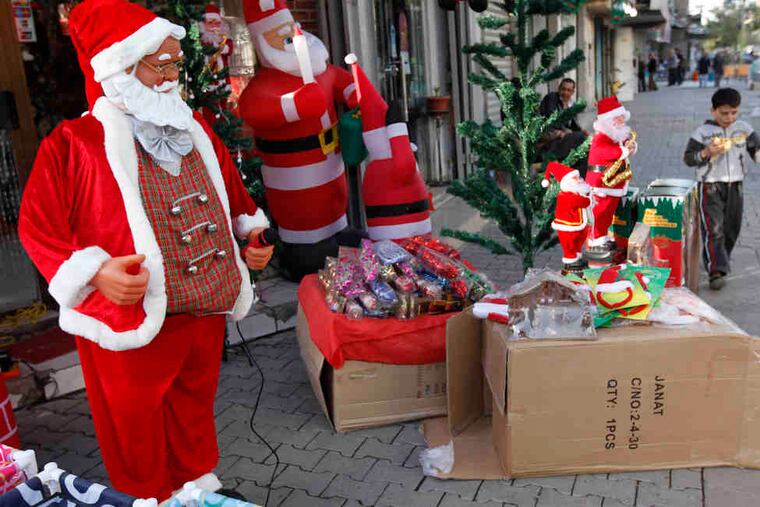Silent night, harrowing time for Iraq's Christians
No Christmas trees, no Santa as the tiny community hears new threats.

KIRKUK, Iraq - No decorations, no midnight Mass. Even an appearance by Santa Claus was nixed, as Iraq's Christians called off Christmas celebrations amid new al-Qaeda threats.
The ancient but tiny community is still shaken from a bloody siege of a Baghdad church. Sixty-eight people were killed Oct. 31 in the assault on Our Lady of Salvation Church as its Catholic congregation was celebrating Sunday Mass.
Days later, Islamic insurgents also bombed Christian homes and neighborhoods across the capital.
On Tuesday, al-Qaeda insurgents threatened more attacks on Christians, many of whom have fled their homes or even the country since the church attack.
A council representing Christian denominations across Iraq advised followers to cancel public celebrations of Christmas out of concern for their lives and as a show of mourning for the victims of the violence.
"Nobody can ignore the threats of al-Qaeda against Iraqi Christians," said Chaldean Archbishop Louis Sako in Kirkuk. "We cannot find a single source of joy that makes us celebrate. The situation of the Christians is bleak."
Church officials in Baghdad, as well as in the northern cities of Kirkuk and Mosul and the southern city of Basra, said they would not put up Christmas decorations or celebrate midnight Mass. They urged worshipers not to decorate their homes. In Kirkuk, an appearance by Santa Claus was called off.
"It's to avoid any attacks, but also to show that people are sad, not happy," said Younadim Kanna, a Christian lawmaker from Baghdad.
Even before the church attack, thousands of Christians were fleeing Iraq. They make up more than a third of the 53,700 Iraqis resettled in the United States since 2007, according to State Department statistics.
Since the church attack, about 1,000 families have fled to Iraq's safer Kurdish-ruled north, according to the United Nations.
The latest threats were posted late Tuesday by the Islamic State of Iraq, an al-Qaeda front group, on a website frequented by Islamic extremists. The group said it wanted the release of two women it claimed were being held captive by Egypt's Coptic Church.
Muslim extremists in Egypt accuse the Coptic Church of detaining the women to allegedly convert them to Islam, a charge the church denies. The message posted Tuesday, addressed to Iraq's Christian community, said it was meant to "pressure" Egypt.
Few reliable statistics exist on the number of Christians remaining in Iraq, a mostly Muslim nation of 29 million. A recent State Department report said Christian leaders estimate there are 400,000 to 600,000, down from a prewar level of 1.4 million.
For those who remain, Christmas will be a somber affair.
In Kirkuk, 180 miles north of Baghdad, Sako said there would be no Christmas decorations outside churches and money usually used on celebrations or gifts would go to Christian refugees.
Ashour Binyamin, a 55-year-old Christian in Kirkuk said he and his family would not go to church on Christmas and would celebrate at home.
At Our Lady of Salvation Church, where more than 120 parishioners were held hostage by gunmen during the four-hour siege, all Christmas Masses have been canceled. Only a modest manger display will mark the occasion.
"We are still in deep sorrow over the innocent victims who fell during the evil attack," said Father Mukhlis.
In Baghdad's Karradah neighborhood, where many of the city's remaining Christians live, churches were guarded by security forces Wednesday and surrounded by razor wire. Shop owners said few people were buying the Christmas trees and Santa Claus toys on sale.
Ikhlas Bahnam vowed to go to Mass on Christmas Day, despite what she called the government's failure to protect her small community. But she will not visit friends during the holiday season. All of them have fled, she said.